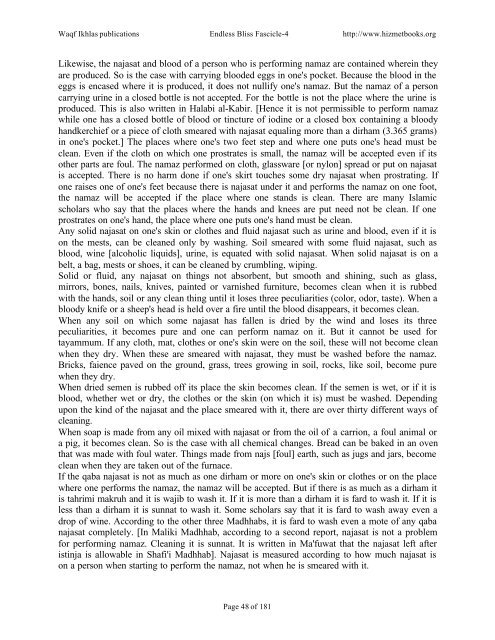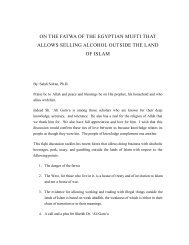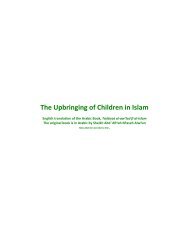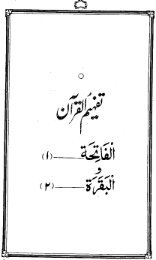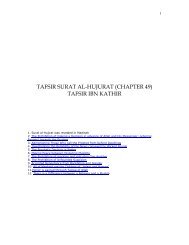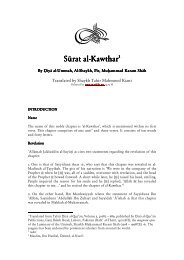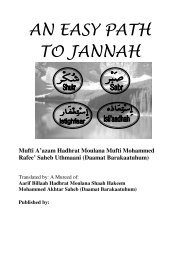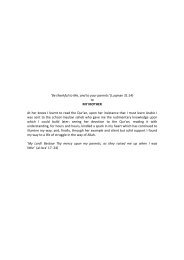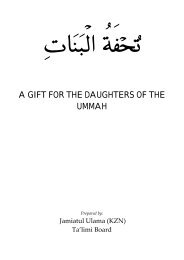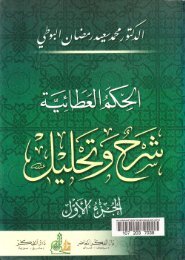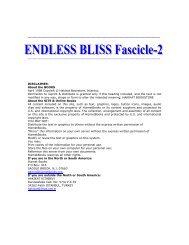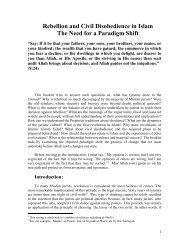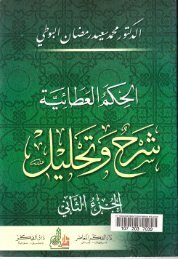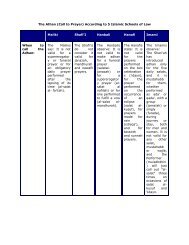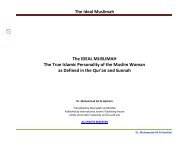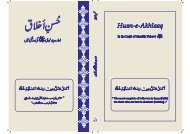ENDLESS BLISS FASCICLE-4
ENDLESS BLISS FASCICLE-4
ENDLESS BLISS FASCICLE-4
Create successful ePaper yourself
Turn your PDF publications into a flip-book with our unique Google optimized e-Paper software.
Waqf Ikhlas publications Endless Bliss Fascicle-4 http://www.hizmetbooks.org<br />
Likewise, the najasat and blood of a person who is performing namaz are contained wherein they<br />
are produced. So is the case with carrying blooded eggs in one's pocket. Because the blood in the<br />
eggs is encased where it is produced, it does not nullify one's namaz. But the namaz of a person<br />
carrying urine in a closed bottle is not accepted. For the bottle is not the place where the urine is<br />
produced. This is also written in Halabi al-Kabir. [Hence it is not permissible to perform namaz<br />
while one has a closed bottle of blood or tincture of iodine or a closed box containing a bloody<br />
handkerchief or a piece of cloth smeared with najasat equaling more than a dirham (3.365 grams)<br />
in one's pocket.] The places where one's two feet step and where one puts one's head must be<br />
clean. Even if the cloth on which one prostrates is small, the namaz will be accepted even if its<br />
other parts are foul. The namaz performed on cloth, glassware [or nylon] spread or put on najasat<br />
is accepted. There is no harm done if one's skirt touches some dry najasat when prostrating. If<br />
one raises one of one's feet because there is najasat under it and performs the namaz on one foot,<br />
the namaz will be accepted if the place where one stands is clean. There are many Islamic<br />
scholars who say that the places where the hands and knees are put need not be clean. If one<br />
prostrates on one's hand, the place where one puts one's hand must be clean.<br />
Any solid najasat on one's skin or clothes and fluid najasat such as urine and blood, even if it is<br />
on the mests, can be cleaned only by washing. Soil smeared with some fluid najasat, such as<br />
blood, wine [alcoholic liquids], urine, is equated with solid najasat. When solid najasat is on a<br />
belt, a bag, mests or shoes, it can be cleaned by crumbling, wiping.<br />
Solid or fluid, any najasat on things not absorbent, but smooth and shining, such as glass,<br />
mirrors, bones, nails, knives, painted or varnished furniture, becomes clean when it is rubbed<br />
with the hands, soil or any clean thing until it loses three peculiarities (color, odor, taste). When a<br />
bloody knife or a sheep's head is held over a fire until the blood disappears, it becomes clean.<br />
When any soil on which some najasat has fallen is dried by the wind and loses its three<br />
peculiarities, it becomes pure and one can perform namaz on it. But it cannot be used for<br />
tayammum. If any cloth, mat, clothes or one's skin were on the soil, these will not become clean<br />
when they dry. When these are smeared with najasat, they must be washed before the namaz.<br />
Bricks, faience paved on the ground, grass, trees growing in soil, rocks, like soil, become pure<br />
when they dry.<br />
When dried semen is rubbed off its place the skin becomes clean. If the semen is wet, or if it is<br />
blood, whether wet or dry, the clothes or the skin (on which it is) must be washed. Depending<br />
upon the kind of the najasat and the place smeared with it, there are over thirty different ways of<br />
cleaning.<br />
When soap is made from any oil mixed with najasat or from the oil of a carrion, a foul animal or<br />
a pig, it becomes clean. So is the case with all chemical changes. Bread can be baked in an oven<br />
that was made with foul water. Things made from najs [foul] earth, such as jugs and jars, become<br />
clean when they are taken out of the furnace.<br />
If the qaba najasat is not as much as one dirham or more on one's skin or clothes or on the place<br />
where one performs the namaz, the namaz will be accepted. But if there is as much as a dirham it<br />
is tahrimi makruh and it is wajib to wash it. If it is more than a dirham it is fard to wash it. If it is<br />
less than a dirham it is sunnat to wash it. Some scholars say that it is fard to wash away even a<br />
drop of wine. According to the other three Madhhabs, it is fard to wash even a mote of any qaba<br />
najasat completely. [In Maliki Madhhab, according to a second report, najasat is not a problem<br />
for performing namaz. Cleaning it is sunnat. It is written in Ma'fuwat that the najasat left after<br />
istinja is allowable in Shafi'i Madhhab]. Najasat is measured according to how much najasat is<br />
on a person when starting to perform the namaz, not when he is smeared with it.<br />
Page 48 of 181


